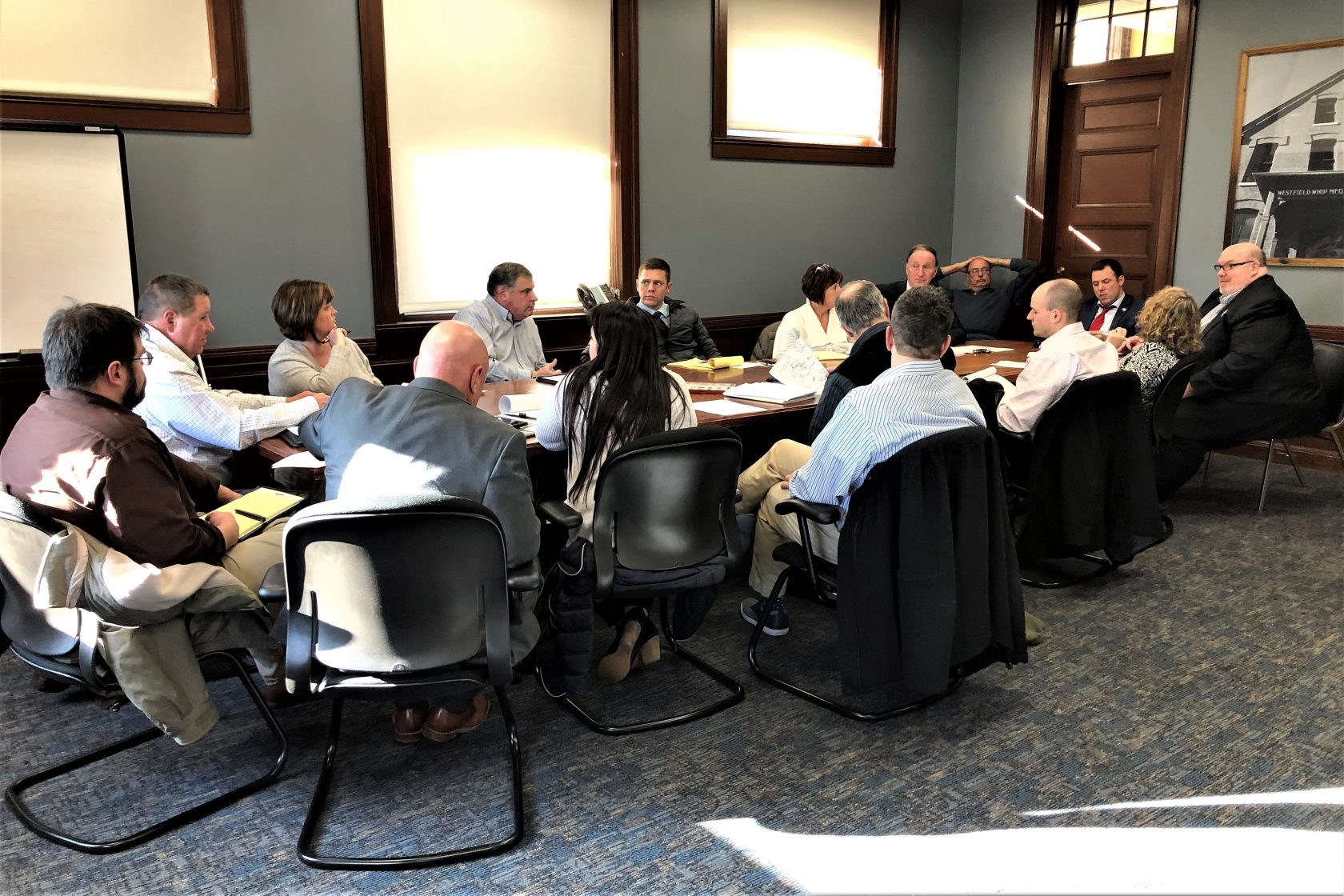
Leaders from Agawam, Chicopee, Holyoke, Springfield and West Springfield came to Westfield Friday to discuss increases in disposal of recycling materials. (Photo by Amy Porter)
WESTFIELD – Acting Mayor Ralph J. Figy Dec. 20 welcomed and thanked legislators, city leaders and department heads from Agawam, Chicopee, Holyoke, Springfield and West Springfield who gathered in Westfield to talk about recycling.
Figy turned the meeting over to Westfield Department of Public Works Director David Billips and Director of Purchasing Tammy Tefft.
Joining the meeting were state Representatives John C. Velis of Westfield and Aaron Vega of Holyoke, Mayor-elect Donald F. Humason, Jr., Mayor William P. Sapelli of Agawam, Mayor Richard Kos of Chicopee, Mayor William Reichelt of West Springfield, Chief of Staff Mike Bloomberg of Holyoke, and Chris Cignoli of the Springfield DPW, among others.
Billips said he asked for the meeting because the city has been paying nothing for recycling for years, and transporting recyclables to the Material Recycling Facility on Bondi’s Island in Springfield, which is owned by the Department of Environmental Protection and leased to Waste Management.
In the new three-year contract with the company, the cost of recycling materials has increased from zero to $150 a ton, which Billips said is more than $500,000 per year for Westfield.
“We need to make a decision by the end of January,” he said, adding that the cost of recycling will be almost double the cost of trash.
Billips said one of the problems is there is not a lot of time. He said he looked at other recycling companies, but Westfield would have to haul the material further, and the trucks would take a beating.
Tefft also said that she was concerned that the city can’t get out of the contract for three years. Other DPW representatives at the table said there is an out after a year, but all agreed the language was unclear on the cost or penalties. “I want something that says I can get out after a year. We’re under the gun here,” she said.
All of the communities represented at the table were facing the same increases, which combined came to about $6 million.
One option some communities were considering was to eliminate glass from the recycling, because currently there are no incentives for businesses to use recycled glass, and it is easier and cheaper to use raw materials. Glass is also a destroyer of equipment and contaminant of materials, according to the DPW professionals around the table. They also said it cost $500 a ton to get rid of electronic equipment.
They said the DEP incentivized cities to go to single stream recycling and improved the sorting technology, but they need an actual market for recyclables. There were also comments made that the DEP is not looking out for single stream communities.
Humason said he liked the comment that if recycling is so much more expensive, why not just revert to waste disposal. “We’re starting to train our constituents well, but there’s nowhere to put it,” he said about the recycled materials, calling it a real “budget buster.”
Reichelt agreed with Humason, saying that while the state mandates communities to recycle the products, if it costs more to recycle them, there is not much incentive to do it.
Bloomberg said they have been having the same conversations in Holyoke. He said they have three manufacturers in the city that take recycled paper. “This needs to be a priority in Mass.,” Bloomberg said, adding that they have to go to the DEP and state and ask them how they are going to help the communities out with the increases.
Bloomberg suggested seeking a $5 million grant available to communities that work together on sustainable energy. He said the funds are for innovative projects, but “the fact that we’re literally having a conversation about ending recycling and setting the clock back 50 years,” it may be needed to save the recycling program. He said there is also up to $40 million a year in unclaimed funds from the bottle bill that could be applied to the problem.
Bloomberg said Holyoke does not have the funds for the increases. “What can the. state do for one year? Let’s have this conversation,” he said, adding that while the contracts are due to be signed in January, the bills don’t have to be paid for six months.
“We need to find a way to buy a year,” Billips said, adding he hopes that the state can reimburse the communities.
Most around the table agreed that they will probably have to sign the contracts after getting clarification on opt-out clauses, and also agreed to work together to lobby legislators to find a solution.
“This was a great meeting, having everybody in the room together to collaborate is what we need. The expense to city government is something that we as legislators can solve, if state representatives and senators from affected districts work together,” said Velis, who said he would be speaking to colleagues and start talking immediately to the Baker Administration.
Velis said he would bring up the irony that cities and towns are considering going back to trashing it. He said they will need to find any source of funds out there to buy the cities some time.








